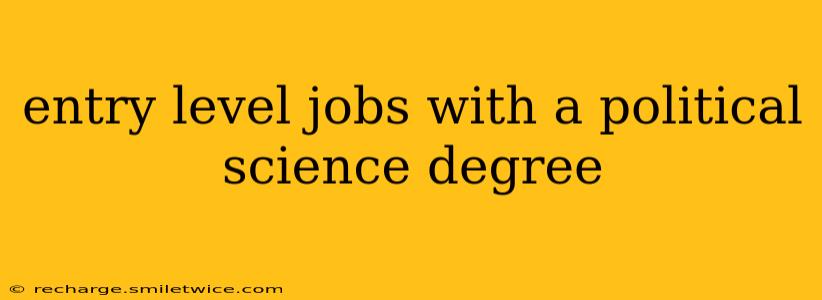A political science degree equips you with valuable skills applicable across numerous sectors. While a direct path into politics might seem the most obvious, the reality is far more diverse. This comprehensive guide explores various entry-level job options for political science graduates, highlighting the transferable skills you've gained and how to leverage them effectively.
What Skills Do Political Science Graduates Possess?
Before diving into specific job roles, let's identify the core skills you've honed during your studies:
- Research and Analysis: Political science emphasizes rigorous research methods, data analysis, and critical thinking. You're adept at identifying, evaluating, and interpreting information from diverse sources.
- Communication (Written & Verbal): Effectively conveying complex ideas through clear writing and persuasive speaking is crucial in political science. You've likely practiced crafting compelling arguments and presentations.
- Problem-Solving: Analyzing political issues requires identifying problems, evaluating potential solutions, and proposing effective strategies. This is a highly transferable skill.
- Policy Analysis: Understanding the formulation, implementation, and evaluation of public policy is a key component of many political science programs.
- Interpersonal Skills: Collaboration and teamwork are often involved in political science research and projects, leading to strong interpersonal and networking skills.
Entry-Level Job Options for Political Science Graduates
The career paths for political science graduates are surprisingly broad. Here are some popular entry-level positions:
1. Government and Public Sector Roles
- Legislative Aide/Assistant: Supporting a member of Congress or a state legislator with research, constituent communication, and policy analysis.
- Government Analyst/Researcher: Conducting research and analysis to inform policy decisions within various government agencies.
- Campaign Staff: Working on political campaigns, managing social media, fundraising, or voter outreach. These roles are often temporary but offer invaluable experience.
- Public Policy Intern: Gaining hands-on experience within government agencies or non-profit organizations focused on public policy.
2. Non-Profit and Advocacy Organizations
- Research Associate/Analyst: Conducting research and analysis to support advocacy efforts on specific policy issues.
- Program Assistant: Assisting with program implementation, outreach, and administrative tasks.
- Development Associate/Fundraising Assistant: Supporting fundraising efforts through research, outreach, and donor relations.
3. Private Sector Opportunities
- Market Research Analyst: Analyzing consumer behavior and market trends, leveraging your research and analytical skills.
- Communications Specialist: Crafting compelling narratives and messages for various organizations, using your strong writing and communication skills.
- Political Risk Analyst: Assessing political risks and their impact on businesses in various regions, using your knowledge of global politics and policy.
- Intelligence Analyst: Analyzing information to identify trends and patterns, drawing on research and analytical abilities.
4. Journalism and Media
- Reporter/Journalist: Covering political news and events, requiring strong writing and research skills. Many journalists begin in entry-level reporting roles.
- Political Blogger/Writer: Sharing insights and analysis on political issues through online platforms.
Frequently Asked Questions (FAQ)
What is the average starting salary for an entry-level political science graduate?
Salaries vary greatly based on location, specific job role, and employer. However, you can expect a range that is competitive with other entry-level social sciences graduates. Online resources like Glassdoor and Salary.com provide salary data for specific job titles.
Do I need a master's degree in political science to advance my career?
While a bachelor's degree is sufficient for many entry-level roles, a master's degree (like a Master of Public Policy or Master of Public Administration) can significantly enhance career prospects and open doors to higher-paying positions. It often depends on your career aspirations.
How can I gain experience in the field before graduating?
Internships are crucial. Seek out internships with government agencies, non-profit organizations, political campaigns, or research firms. Actively participate in extracurricular activities related to political science, such as student government or debate clubs.
What are the best resources to find entry-level jobs in political science?
Utilize online job boards (Indeed, LinkedIn, Glassdoor), government websites (USAJOBS), and professional organizations related to political science and public policy. Network with professors, alumni, and professionals in the field.
Conclusion
A political science degree opens doors to a surprising range of careers. By effectively highlighting your transferable skills and proactively seeking opportunities, you can launch a successful and rewarding career path. Remember to tailor your resume and cover letter to each specific job application, emphasizing the relevant skills and experience. Good luck!
